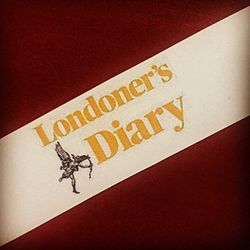Londoner's Diary
 |
|
| Editor | Joy Lo Dico |
|---|---|
| Categories | Society, Politics, Arts, Fashion, Theatre, Gossip |
| Frequency | Daily |
| Circulation | 900,000 |
| First issue | 11 April 1916 |
| Based in | London |
| Website | "Londoner's Diary". |
The Londoner's Diary is a gossip column in the London Evening Standard. Since 1916 the column has provided readers with witty and mischievous insights into high society; from political scandals and literary feuds to the backstage gossip at fashion parties and film premieres. Charles Wintour, who edited the Standard throughout the sixties, once declared: "To go to a decent London dinner party without having read the Diary would be to go out unprepared for proper conversation."
The Londoner's Diary first appeared on 11 April 1916. Arthur Mann, the Standard's editor at the time, announced that it would consist of “three columns written daily by gentlemen for gentlemen” with a distinctive slant on politics, personalities and London based stories. The section was the first of its kind; as early as 1917 it was noted that “the best tribute to ‘A Londoner's Diary’ is the fact that it now has its counterpart in the other penny evening papers in London.”
In 1923 The Evening Standard was acquired by Lord Beaverbrook, the wildly influential Canadian press baron who was gleefully parodied as the ruthless Lord Monomark in Evelyn Waugh’s Vile Bodies and Stephen Fry’s film adaptation Bright Young Things.
With London still reeling from the horrors of the First World War, Beaverbrook was the first proprietor on Fleet Street to understand how eager his readers were to be entertained by glittering gossip.
However he saw the Londoner’s Diary as more than just a means of profitably popularising the paper. Beaverbrook "regarded the nightly diary page in the Evening Standard as his own personal fiefdom… an armoury from which he could seize a weapon at will; bludgeon, cudgel and rapier lay at his disposal as he sought to fight his way to ever greater heights of power and influence in between-the-wars Britain."
The Diary provided a mischievous platform for political gossip and upper crust scandal, regaling readers with titbits on the private lives of London’s high society: their excesses, their pets and their dinner-parties – but never their love affairs.
...
Wikipedia
